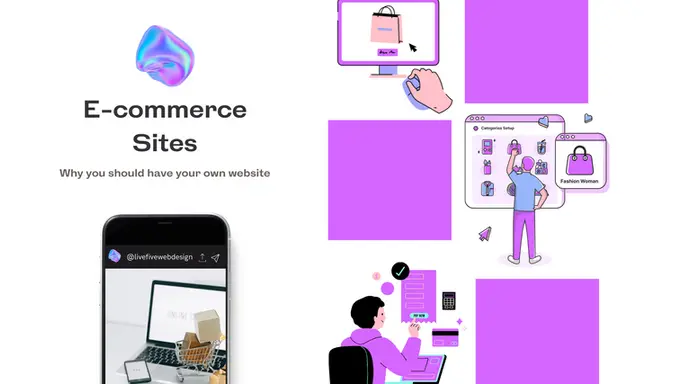Why Third-Party Platforms Aren’t Enough
It’s easier than ever to start selling online. Third-party platforms like Amazon and Etsy offer ready-made marketplaces with a vast customer base. But relying solely on these platforms can limit your business growth potential and put you at risk of losing control over crucial aspects of your business. In this blog post, we’ll explore why having your own e-commerce website is essential for every online seller who wants to take their business to the next level. From increased branding opportunities to better data insights, discover the benefits of building your own platform that goes beyond what third-party sites have to offer.
E-commerce Website
What is an e-commerce website?
An e-commerce website is a website that allows businesses to sell products or services online. By having their own e-commerce website, businesses can have full control over their online sales process, from start to finish. This control includes setting their own prices, shipping rates, and return policies. In addition, this website allows you to better customize your look so it matches your brand identity while providing greater insights on your customers, including buying habits that can be used to improve marketing and sales strategies.
Benefits of having your own e-commerce website
There are many benefits to having your own e-commerce website, including:
1. Brand and Design Control: You have complete control over your brand and how it’s presented to the world. You’re at the mercy of their design and functionality choices on a third-party platform.
2. Data Ownership: You own your customer data. This is critical for developing a long-term relationship with your customers and growing your business. On a third-party platform, they can (and often do) change their terms of service, which can result in you losing access to your customer data or being forced to pay exorbitant fees to keep it.
3. Flexibility: You have more flexibility in how you market and sell your products. On a third-party platform, you’re limited by their rules and restrictions. For example, many platforms don’t allow you to run promotional sales or offer discounts without approval from them first – and they often take a cut of any sales you make.
4. Scalability: You can scale much more easily on your own website than on a third-party platform. As your business grows, you’ll need more flexibility and customization that most platforms simply can’t provide without significant (and expensive) upgrades.
5. Equity and Trust: You build equity in your business with every sale made on your own website rather than someone else’s platform. Over time, this can be worth tens or even hundreds of thousands of dollars – money that will
Tips for setting up an e-commerce website
When creating an e-commerce business, using a third party like Shopify, BigCommerce, or Etsy can be helpful! There are advantages to these platforms, but there are also greater ones with platforms like WordPress or Wix or getting a custom website designed and coded by a web developer.
Here are a few tips for setting up your own e-commerce website:
1. Choose the right platform: There are many different e-commerce platforms available, so it’s important to choose one that’s right for your business. Consider factors like features, ease of use, cost, and scalability when making your decision.
2. Find a reliable hosting provider: Your e-commerce website will need to be hosted on a web server, so it’s important to find a reliable hosting provider that offers fast speeds and uptime.
3. Get a professional domain name: Your domain name is your website’s address on the internet, so it’s important to choose one that’s easy to remember and reflects your brand well. A professional domain name can also help you improve your search engine ranking.
4. Design a user-friendly website: Make sure your website is easy to navigate and looks professional in order to give visitors the best possible experience. Creating an engaging user experience will help encourage people to buy from you again in the future.
Third-Party Platforms
Pros and cons of using third-party platforms like Etsy or Amazon
There are a few key reasons why having your own e-commerce website is better than using a third-party platform like Etsy or Amazon. With your own website, you have full control over the design, branding, and user experience. You’re also able to build a more comprehensive product offering than what’s available on third-party platforms.
However, there are a few drawbacks to having your own e-commerce website. The upfront cost of development and hosting can be significant, and you’ll need to invest time in marketing your site to drive traffic. There’s also the risk that you won’t be able to generate enough sales to justify the cost of running your own website whereas these third-party platforms have large customer bases.
Conclusion
Ultimately, it’s up to you to weigh the pros and cons of using a third-party platform or building your own e-commerce website. If you have the budget and are willing to put in the effort required to market your site, then having your own website is likely the better option. Additionally, in many cases, it doesn’t have to be an “either-or” situation– you can use both a third party and a website as means of selling your offering to your target audience. It’s all about ensuring proper placement.
Looking to sell online and want a website? Contact us today! Our team can cater to your selling desires because of our experience with third-party platforms, hosting platforms, and custom website coding.




